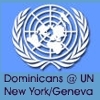

| BRIEFING - November 16, 2012 | To learn more about the Millenium Development Goals, click on the graphic Read the summer edition of the newsletter “Dominicans at the UN” (PDF) Past Briefings: October 17, 2012 September 26, 2012 September 12, 2012 August 29, 2012 July 11, 2012 May 30, 2012 May 16, 2012 April 18, 2012 April 4, 2012 March 7, 2012 February 22, 2012 February 8, 2012 January 25, 2012 January 11, 2012 |
|
Human trafficking: ‘We are our brothers’ and sisters’ keepers’ By Kati Garrison, Dominican Volunteer As a part of the NGO Committee to Stop Trafficking in Persons, I received several invitations over the past few months to attend forums and events pertaining to the topic of human trafficking. In fact, one of the very first meetings I sat in on after arriving in New York City was a briefing on the 2012 Trafficking in Persons Report at the U.S. Mission to the United Nations. This specific experience stands out in my mind because the discourse of that afternoon pertained to the United States, whereas frequently the topics of discussion at the UN emphasize matters confronting the developing world. As a result of trafficking, an estimated 2.5 million people are currently trapped in conditions of forced labor. Every country in the world is affected by trafficking, whether as a country of origin, transit, or destination for victims Trafficking happens right here in the United States. As President Obama articulated in his address to the Clinton Global Initiative, “It’s the migrant worker unable to pay off the debt to his trafficker. The man, lured here with the promise of a job, his documents then taken, and forced to work endless hours in the kitchen. The teenage girl, beaten, forced to walk the streets. This should not be happening.” For the first time, this year’s trafficking report included the United States because it was deemed that this country could not demand that other nations adopt and enact measures to combat trafficking if we do not hold ourselves accountable regarding the same issue. How can we as individual citizens play a part in the prevention of human trafficking? I think that too often, the term trafficking is associated exclusively with the concept of the commercial sex trade industry, and accordingly our perception of options for intervention and prevention remains narrow in scope. However, it is imperative to recognize that human trafficking encompasses a wide range of industries. In accordance with Article 3 of the Protocol to Prevent, Suppress, and Punish Trafficking in Persons, trafficking is defined as:
Therefore, trafficking transpires in a multitude of domains that we interact with everyday. Trafficking takes place in:
Just recently, I attended a screening of the documentary “Walking Merchandise.” This film draws attention to child trafficking and the snakehead trade. To provide a brief synopsis, snakeheads are essentially human smugglers that bring children into the United States for an exorbitant cost. After arriving in the country, these children labor for years in substandard conditions, for minimal pay, in the endeavor to pay off steeply inflated smuggling debts. One of the examples illustrated in the film called attention to trafficked children working in Chinatown, right here in New York City. Due to this increased awareness, I began to question in what other ways trafficking touches my own life. I quickly recognized that my daily habits share an association with the trafficking trade—the clothes I wear, the food I eat, and the products that I buy. Each of these items potentially possesses ties to individuals in circumstances of forced labor. As revealed in a statement by our country’s own FBI, “It’s sad but true: here in this country, people are being bought, sold, and smuggled like modern-day slaves.” Of course, the U.S. government has taken a number of actions to combat this flagrant human rights violation, but each and every citizen needs to assume responsibility as well in the campaign to abolish human trafficking. As Obama expressed:
To learn more about your own connection with forced labor trafficking, visit www.slaveryfootprint.org.
|
Dominican Leadership Conference
Building relationships and collaborating in the mission of preaching the Gospel
29000 West Eleven Mile Road
Farmington Hills MI 48336
248-536-3234 Contact: Executive Director

